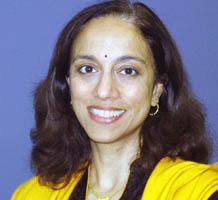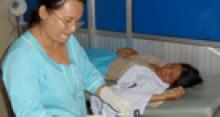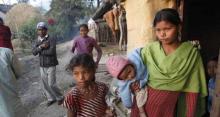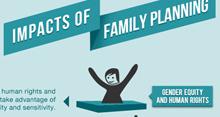Choosing Motherhood
Big Ideas
Leading thinkers and activists share game-changing ideas about motherhood and improving maternal health and women's rights.

Ammi, my mother-in-law, was 16 when her marriage was arranged. Before she was 18, she had borne her first child, who died within the year because of an infectious disease. Pregnant again at 19, she journeyed 1,000 miles from her small village in eastern India to reconnect with her husband in Karachi, in the new state of Pakistan. By 30, she had borne seven children. She had finished her schooling at the age of ten, and, like others of her generation, knew very little about contraceptive choices.
But Ammi was determined that her children would have other options. My husband, Zulfiqar, his five surviving siblings, and spouses are all educated beyond the university level and none has more than two children. There are strong correlations between levels of education for women and lower fertility levels. Educated women have more choices about how they will live, whom they will marry and how many children they will bear.
Yet for millions of women in modern day Pakistan, like Rani, the young woman who cleans Ammi’s home in Karachi, access to basic contraception remains almost as remote as it was to Ammi more than 50 years ago. Married off to a cousin at 15 and illiterate, Rani already has three children and, like the majority of married Pakistani women who have never used modern contraception, she will likely have more.
Around the world, hundreds of millions of women like Rani are still denied a basic education, married off early against their wills, subjected to forced sex, or simply unable to access, afford, or negotiate with their partners about birth control. Most would like more control over how and when they become sexually active or pregnant, but lack the personal power, basic information, and access necessary to make informed choices. Their lack of autonomy is a legacy of women’s low status in most societies, as prescribed by most religions and cemented by centuries of tradition. Such traditions have established women as “less than’ not only in the public sphere and in the workplace, but in their private lives too.
However, the ability to determine whether and when to become pregnant is far more than 'just' a question of assuring women’s basic human rights - it is also a proven health and development strategy. When a woman can control the number and spacing of her children, she, her family and her community are healthier as a result. Women who have access to contraception and education choose to have smaller families. And as the world reaches a tipping point - with the 7 billionth citizen born in 2011 - we are pressed for effective, safe and voluntary strategies that can help us design a more sustainable future not just for women, but for our common mother – planet earth.
World leaders agree. At the Millennium Summit in 2000, 189 United Nation members and 23 leading development institutions agreed to eight Millennium Development Goals. These goals contain 18 measurable targets to be achieved by 2015, including universal access to family planning.
Yet, this alleged global consensus conceals a complex and perplexing reality. Although access to family planning has become enshrined as a global goal at the level of the United Nations, efforts to roll back and curtail women’s rights and access to contraception are being actively promoted by governments and religious leaders all over the world.
From mainstream Republican politicians in the United States who have refused to allow the US Senate to ratify CEDAW, the UN treaty on the rights of women, to orthodox Rabbis in Jerusalem, fundamentalist imams in Iraq and groups like the Taliban in Afghanistan, to the Vatican in Rome – there is a resurgence of forces seeking to turn back the clock on women's rights and access to contraception. Their growing clout would shock pioneers from the last century - women like Margaret Sanger who fought to make birth control available and who famously declared, “No woman can call herself free until she can choose consciously whether she will or will not be a mother.”
In part because of this backlash, studies show that today over 200 million women world wide want to use contraception, but have no knowledge of or access to the most basic forms – condoms, pills and IUDs. At the same time, abortion continues to be illegal, unsafe and inaccessible to most poor women – and overused as a form of contraception because, without proper sex education and prevention, unintended pregnancies occur all the time.
When all women are able to choose to engage in sex, ensure that it is safe, decide how many children they want, and raise those children in decent living conditions, the world will be a much better place. Women’s health, children’s health, and opportunities for families and communities will improve dramatically.
So what can we do to ensure that every woman - no matter where in the world she lives - has a say in if and when she becomes a mother?
We can learn more about the realities of women who lack the rights and choices we may take for granted, through websites such as this one and through partners such as AWID, the Global Fund for Women, Women’s Funding Network and World Pulse. We can act to amplify their voices, sharing their stories so that others can learn, understand and take action.
We can live by Eleanor Roosevelt’s words that “human rights start in small places, close to home.” We can model our values in our parenting, raising both our daughters and sons to value one another, seek education, share household chores, and celebrate their sexuality.
We can vote for all women to have the right to access and knowledge about family planning. We can demand that our elected representatives ratify CEDAW - the UN Treaty on women's rights. We can stand up for the UN and for UN Women. We can support efforts for change with our advocacy, with our philanthropy, and with our votes.
If we do these things, Rani’s children will grow up with hope and opportunity and choice. And that would make my Ammi smile!
Related Content
|
Prum Than empowers women to make safe reproductive health choices in her work at a reproductive and maternal health care clinic in Cambodia. |
Artist Miriam Schaer embroidered toddler dresses with quotes that depict the prejudice and hostility women without children face. |
Meredith May tells the story of Anita, a Nepalese girl who was sold as a domestic servant for $75. Nine years later, Anita sought justice. |
All women should have the right to make informed choices about childbearing and access reproductive health services. Yet in too many places, the right to control one’s body and destiny is not recognized. |





